Each week, OMRF Vice President of Research Dr. Rod McEver opens “Adam’s Journal” to answer a medical question from Adam Cohen, OMRF’s senior vice president & general counsel.
Adam’s Journal
Here’s a question from a coworker:
My grandmother has increased difficulty hearing, but she is hesitant to get hearing aids. If she leaves her hearing loss unchecked, could it also lead to other health problems?
Kate Miller
Oklahoma City
Dr. McEver Prescribes
Hearing loss is one of the most common conditions affecting older adults. According to the National Institute on Aging, nearly half of those older than 75 have difficulty hearing.
In addition to causing isolation and depression, untreated hearing problems also have a strong link to dementia.
In a study that tracked 639 adults for a dozen years, researchers at the Johns Hopkins School of Medicine found that older adults with mild hearing loss had twice the risk of developing dementia compared to those with normal hearing. In cases of more severe hearing impairment, that risk grew even larger.
Similarly, a blue-ribbon commission established by the medical journal The Lancet found that hearing loss is a leading risk factor for developing dementia. In 2017, the commission estimated that hearing loss accounts for as many as 800,000 new cases of dementia diagnosed each year.
Hearing aid technology has advanced significantly over the years. In addition to improving hearing, today, hearing aids can double as Bluetooth headphones, detect falls, and through telehealth, can be adjusted from home rather than in an audiologist’s office.
There are many possible causes of hearing loss, including noise exposure, head injuries, infections, and even our DNA. Scientists at the Oklahoma Medical Research Foundation are working to identify genetic causes of hearing loss. That knowledge will better equip researchers to potentially develop medications for some instances of the condition.
Until then, though, hearing aids can help most people who try them. Your grandmother is far from alone in her reluctance to use them, but if she gives them a try, they could make a significant difference in the quality of her life and her health, both now and in the future.
–
Do you have a health query for Dr. McEver? Email contact@omrf.org and your question may be answered in a future column!



